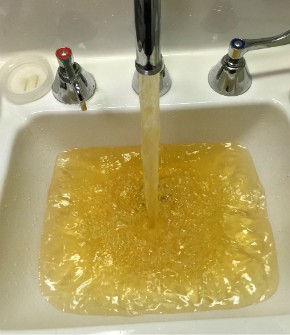When government fails

The people of Flint, Michigan, have been poisoned by their tap water. A 2014 decision to use the Flint River as a water source led to people ingesting unsafe levels of E. coli, chlorination byproducts, and lead. The General Motors plant quickly arranged for an alternate water source; later, the state office building brought in drinking water for employees. Meanwhile, the city’s 99,000 residents—most of them black, two-fifths of them poor—had little information and few options. Many will suffer serious, long-term health effects from toxins consumed even after officials knew about the problem.
The blame goes to a catastrophic failure of government by officials from both parties. The decision to switch to river water was made by a city manager appointed by Republican governor Rick Snyder, but it was supported and promoted by the Democratic mayor. A state agency under Snyder failed to enforce federal guidelines for corrosion control or to follow water-testing protocol; the governor also oversees the state health department, which misdiagnosed the problem and then disputed the correct diagnosis made by others. When an Environmental Protection Agency staffer uncovered the problem, the EPA—which answers to President Obama—kept quiet for months.
As for the heroes in this story, they have been mostly private citizens. Flint resident Leeanne Walters saw the effects on her family and contacted Virginia Tech environmental engineer Marc Edwards. Edwards got water samples from Walters, tested them, and worked tirelessly to attract attention to his startling results. Local pediatrician Mona Hanna-Attisha uncovered the sharp increase in children’s lead levels and then took her findings public.
In light of public failure and private heroism, it’s tempting to use Flint as an example of why we need less government in our lives. But this is the wrong lesson to take. Americans should expect more from government—more responsible management, more accountability, more transparency. Government can’t do everything, but it has unparalleled capacity for tasks like providing water safely and efficiently to every building in town. This scale of government’s reach means government’s failures can be big ones—and so can its successes. What Flint’s heroes accomplished was to pressure government to admit mistakes and change course. This does more than bottled-water donations ever could.
In the aftermath of this crisis, the moral imperative is to care for the victims. Lead poisoning cannot be reversed, but its harm can be reduced via medical interventions, early childhood programs, and healthful food. Lead’s effects on the brain will create even steeper educational odds than Flint children already faced; funds for local schools and college scholarships would help. Wealthier Americans take it for granted that they will have access not just to clean water but to decent health care, nutrition, and education. The poisoned children of Flint deserve all this and more.
The other imperative is to make sure this catastrophe doesn’t happen again, in Flint or anywhere else. Without good government—proactive, transparent, and accountable—neither goal is likely to be achieved.




